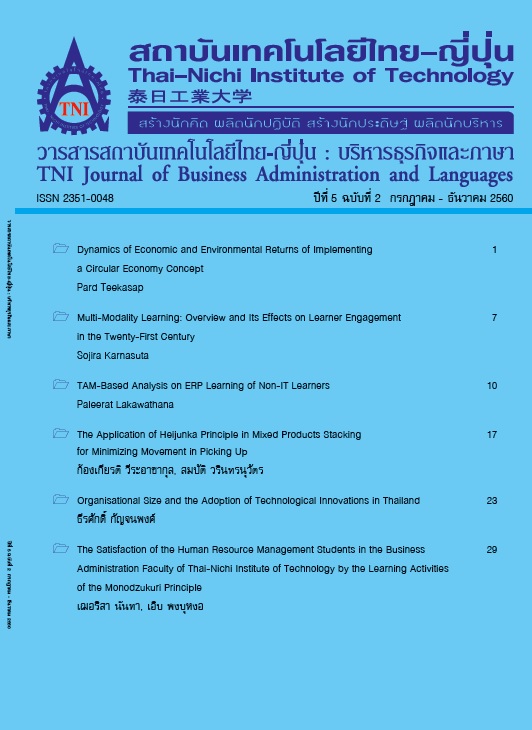A Lean Coach Competency-Based Training Program
Main Article Content
Abstract
The human resources development to cope with the transformation to a Lean organization enforces a company to spend a large expenditure. Through an action research in the model production line, the internal Lean coach, competency-based training program of a hard-disk drive company has been developed in accordance with the 5-step of training program development process. It found that the 34-content Lean coach training program, developed based on twenty-one competencies, was rated in the high scores for its appropriateness; has valid contents and congruence with its objectives for all aspects, and mean scores of Pre -Posttest for learning implied a significant improvement at the confidential level of 95%. The internal Lean coach competency-based training program is a useful and efficient learning instrument to enhance the next generation of Lean coach in transforming to Lean organization.
Article Details
Article Accepting Policy
The editorial board of Thai-Nichi Institute of Technology is pleased to receive articles from lecturers and experts in the fields of business administration, languages, engineering and technology written in Thai or English. The academic work submitted for publication must not be published in any other publication before and must not be under consideration of other journal submissions. Therefore, those interested in participating in the dissemination of work and knowledge can submit their article to the editorial board for further submission to the screening committee to consider publishing in the journal. The articles that can be published include solely research articles. Interested persons can prepare their articles by reviewing recommendations for article authors.
Copyright infringement is solely the responsibility of the author(s) of the article. Articles that have been published must be screened and reviewed for quality from qualified experts approved by the editorial board.
The text that appears within each article published in this research journal is a personal opinion of each author, nothing related to Thai-Nichi Institute of Technology, and other faculty members in the institution in any way. Responsibilities and accuracy for the content of each article are owned by each author. If there is any mistake, each author will be responsible for his/her own article(s).
The editorial board reserves the right not to bring any content, views or comments of articles in the Journal of Thai-Nichi Institute of Technology to publish before receiving permission from the authorized author(s) in writing. The published work is the copyright of the Journal of Thai-Nichi Institute of Technology.
References
“เศรษฐกิจโลกปีพ.ศ. 2559 จะได้รับผลกระทบอย่างหนักจากการฟื้นตัวทางเศรษฐกิจอย่างช้าๆ ของกลุ่มประเทศตลาดเกิดใหม่,” World Bank, 2559. [ออนไลน์]. แหล่งที่มา: https://www.worldbank.org/th/news/press-release/2016/01/06/anemic-recovery-in-emerging-markets-to-weigh-heavily-on-global-growth-in-2016. [เข้าถึง: 23-Jul-2016].
“เศรษฐกิจจีนโตช้าสุดรอบ25ปี,” ไทยโพสต์, 20-Jan-2016. [ออนไลน์]. แหล่งที่มา: https://www.thaipost.net/?q=เศรษฐกิจจีนโตช้าสุดรอบ25ปี. [เข้าถึง: 23-Jul-2016].
G. S. VASILASH, “Achieving excellence: In short order (Manage),” Automotive Design and Production, vol. 114, no. 1, p. 56, 2002.
ใจทิพย์ เชื้อรัตนพงษ์, “การพัฒนาหลักสูตร: หลักการและแนวทางปฏิบัติ,” กรุงเทพฯ, อลีนเพรส, 2539
วัลลภ พัฒนพงศ์. “การสร้างหลักสูตรฝึกอบรมนักพัฒนาหลักสูตรฝึกอบรมสมรรถนะอาชีพ,” วิทยานิพนธ์ กศ.ด. (วิจัยและพัฒนาหลักสูตร), มหาวิทยาลัยเทคโนโลยีพระจอมเกล้าพระนครเหนือ, กรุงเทพฯ, 2554.
อัมรา ฉัตรชัยพลรัตน์. “การพัฒนาหลักสูตรฝึกอบรมเพี่อส่งเสริมความสามารถของครูในการจัดการเรียนรู้เน้นทักษะปฏิบัติสำหรับครูวิชาอาชีพ โรงเรียนเทคโนโลยีภูเขียว จังหวัดชัยภูมิ,” การศึกษาค้นคว้าอิสระ กศ.ม. (หลักสูตรและการสอน), มหาวิทยาลัยมหาสารคาม, มหาสารคาม, 2554.
อาภรณ์ ภู่วิทยพันธุ์, The Pocket Training Series : Training Needs Analysis - Competency Based. กรุงเทพฯ: เอช อาร์ เซ็นเตอร์, 2556.
Rothwell, W.J., & Lindholm, J.E., “Competency Identification, Modeling and Assessment in the USA”, International Journal of Training and Development, Vol.3, No.2, pp. 90 – 105, 1990.
ธำรงศักดิ์ คงคาสวัสดิ์, Competency ภาคปฏิบัติ...เขาทำกันอย่างไร ? กรุงเทพฯ: สมาคมส่งเสริมเทคโนโลยี (ไทย-ญี่ปุ่น), 2006.
L. M. Spencer Jr. and S. M.Spencer, Competence at Work: Models for Superior Performance, 1 edition. New York: Wiley, 1993.
ปิยะชัย จันทรวงศ์ไพศาล, การค้นหาและวิเคราะห์เจาะลึก Competency ภาคปฏิบัติ. กรุงเทพฯ: เอช อาร์ เซ็นเตอร์, 2549.
ณรงค์วิทย์ แสนทอง, มารู้จัก COMPETENCY กันเถอะ. กรุงเทพฯ: เอช อาร์ เซ็นเตอร์, 2550.
อาภรณ์ ภู่วิทยพันธุ์, The Pocket Training Series : การออกแบบโปรแกรมฝึกอบรมบนพื้นฐาน Competency : Training Program : Competency-based. กรุงเทพฯ: เอช อาร์ เซ็นเตอร์, 2557.
ธำรงศักดิ์ คงคาสวัสดิ์, Training Roadmap ตาม Competency...เขาทำกันอย่างไร? กรุงเทพฯ: สมาคมส่งเสริมเทคโนโลยี (ไทย-ญี่ปุ่น), 2556.
อาภรณ์ ภู่วิทยพันธุ์, The Pocket Training Series : การดำเนินการจัดหลักสูตรฝึกอบรมบนพื้นฐาน Competency : Training Implementation : Competency-Based. กรุงเทพฯ: เอช อาร์ เซ็นเตอร์, 2557.
ธำรงศักดิ์ คงคาสวัสดิ์, จัดการฝึกอบรมให้มีประสิทธิผลอย่าง Training Officer มืออาชีพ. กรุงเทพฯ: สมาคมส่งเสริมเทคโนโลยี (ไทย-ญี่ปุ่น), 2554.
อาภรณ์ ภู่วิทยพันธุ์, The Pocket Training Series : การประเมินผลการฝึกอบรมบนพื้นฐาน Competency : Training Evaluation : Competency-Based. กรุงเทพฯ: สมาคมส่งเสริมเทคโนโลยี (ไทย-ญี่ปุ่น), 2558.
สมชาติ กิจยรรยง และ อรจรีย์ ณ ตะกั่วทุ่ง, เทคนิคการจัดฝึกอบรมเพื่อพัฒนาบุคลากรอย่างมีประสิทธิภาพ. กรุงเทพฯ: สมาคมส่งเสริมเทคโนโลยี
(ไทย-ญี่ปุ่น), 2550.
ณพสร สวัสดิบุญญา, พิสิฐ เมธาภัทร, ไพโรจน์ สถิรยากร, และ สิริรักษ์ รัชชุศานติ, “รูปแบบการฝึกอบรมหัวหน้าแผนกวิชาเพื่อพัฒนาหลักสูตรฝึกอบรมการเรียนรู้ โดยใช้ปัญหาเป็นฐานในการจัดการเรียนการสอน,” วารสารวิชาการพระจอมเกล้าพระนครเหนือ, ปีที่ 21, ฉบับที่ 2, หน้า 387–395, 2554.
ชูชัย สมิทธิไกร, การฝึกอบรมบุคลากรในองค์การ. กรุงเทพฯ: สำนักพิมพ์แห่งจุฬาลงกรณ์มหาวิทยาลัย, 2556.
ปราณี หล่ำเบ็ญสะ, “การหาคุณภาพของเครื่องมือวัดและประเมินผล โครงการบริการวิชาการ ท่าสาบโมเดล.” สาขาการวัดและประเมินผล คณะครุศาสตร์ มหาวิทยาลัยราชภัฏยะลา, 2559
บุญชม ศรีสะอาด, “การแปลผลเมื่อใช้เครื่องมือรวบรวมข้อมูลแบบมาตราส่วนประมาณค่า,” วารสารการวัดผลการศึกษา, ปีที่ 2, ฉบับที่ 1, หน้า 64–70, 2539.
ประจักษ์ ปฏิทัศน์, “การตรวจสอบคุณภาพเครื่องมือวิจัย.” มหาวิทยาลัยราชภัฏบ้านสมเด็จเจ้าพระยา, 2559.
กุลประวีณ์ ศิริภูริพลังกร, “การพัฒนาหลักสูตรฝึกอบรมการบริหารคุณภาพทั่วทั้งองค์กรสำหรับธุรกิจบริการรักษาความปลอดภัยในอุตสาหกรรมการบริการ,” วิทยานิพนธ์ บธ.ม. (การพัฒนาธุรกิจอุตสาหกรรมและทรัพยากรมนุษย์), มหาวิทยาลัยเทคโนโลยีพระจอมเกล้าพระนครเหนือ, กรุงเทพฯ, 2556.
วัฒน์บุญกอบ, “การพัฒนาสมรรถนะที่จำเป็นของอาจารย์มหาวิทยาลัยรามคำแหง,” วิทยานิพนธ์ ศ.ศ. (การพัฒนาทรัพยากรมนุษย์), มหาวิทยาลัยรามคำแหง, กรุงเทพฯ, 2552.
J. P. Womack, D. T. Jones, and D. Roos, The Machine That Changed the World: The Story of Lean Production-- Toyota’s Secret Weapon in the Global Car Wars That Is Now Revolutionizing World Industry, Reprint edition. New York, NY: Free Press, 2007.
อังสนา กลิ่นพิพัฒน์ และ จักร ติงศภัทิย์, “การพัฒนาหลักสูตรการฝึกอบรมโค้ชบนพื้นฐานสมรรถนะเพื่อขับเคลื่อนวัฒนธรรมลีน,” ใน การประชุมวิชาการเครือข่ายงานวิจัย สาขาการบริหารเทคโนโลยีและนวัตกรรม ครั้งที่ 8, กรุงเทพฯ, 2559, หน้า 117–126.


